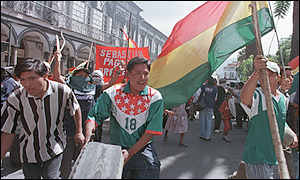 Sporadic fighting has continued in Bolivia, despite a state of emergency declared on Saturday to smother a week of violent protests.
Sporadic fighting has continued in Bolivia, despite a state of emergency declared on Saturday to smother a week of violent protests.
The government called the army onto the streets after protests over water price rises spiralled into violence. At least eight people have died over the weekend.
On Sunday, thousands of farmers angry over the government's handling of an economic slump gathered on the outskirts of the country's third largest city, Cochabamba. Thousands more rallied in the main square.
A commission headed by Vice-President Jorge Quiroga was en route to the central city to negotiate an end to a massive strike called to protest against the new water rates.
In the Andean foothill town of Achacachi, Indian farmers clashed with security forces trying to remove roadblocks.
Two farmers, two soldiers and a police officer were killed, a government spokesman said.
Three protesters were reported dead in separate clashes with police on Saturday.

Police in La Paz
mutinied over pay
In the capital, La Paz, and Santa Cruz, hundreds of police officers marched on their own headquarters demanding a 50% pay increase.
Officers in the capital fired tear gas at soldiers monitoring the protest, while thousands of students and other supporters gathered to show their support for the striking police.
In both cities, police won their salary increases.
State of emergency
President Hugo Banzer imposed a 90-day state of emergency on Saturday allowing for arrests without warrants, restricting the right to protest and establishing a curfew.
The demonstrations began in Cochabamba over a $200m waterworks project that will increase the cost of drinking water by up to 35%.
A law, currently under debate in parliament, would force farmers to pay for water they currently get free.
The president, a former coup leader and military dictator who was elected to power in 1998, has stated he will not back down on the water rates, insisting they are necessary for economic development.
This is the seventh time that a state of emergency has been declared since democracy returned to Bolivia in 1982.